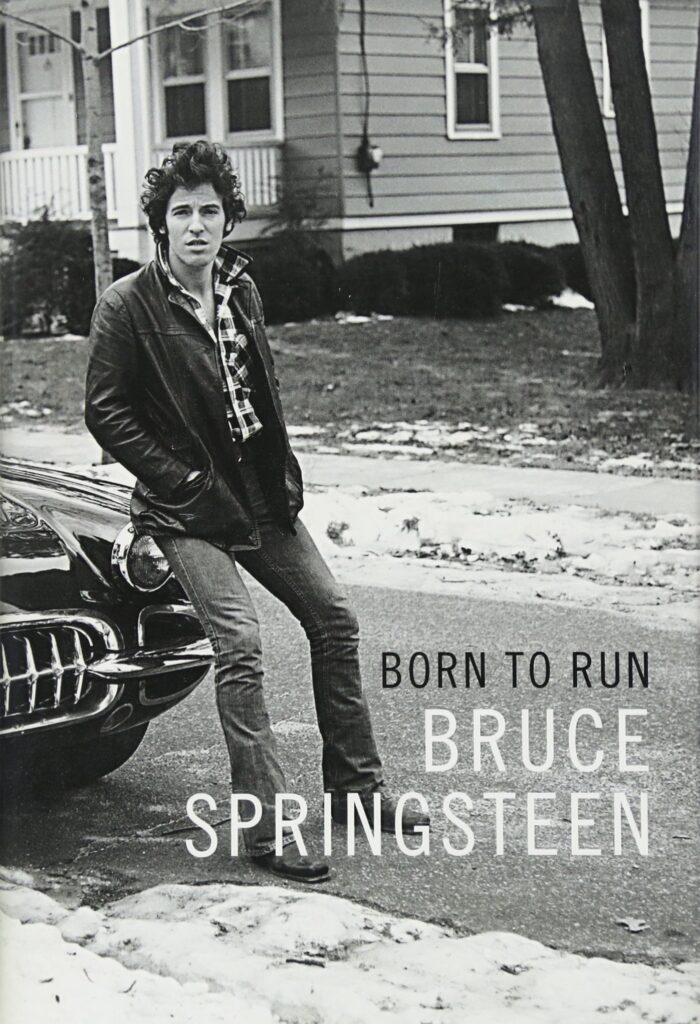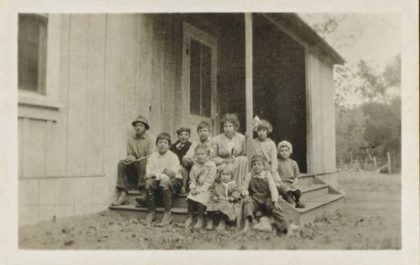
In the early 1970s, Rock and Roll icon Bruce Springsteen recorded his first albums inspired by the lives of the blue collar working class. His 2016 autobiography, Born to Run, begins with a gritty and acutely personal reminiscence of his childhood relationships with family and friends in Freehold, New Jersey; themes that for five decades have been expressed in his music.
While his beginnings were modest, Springsteen writes with passion and affection for the motley cast of characters that occupy “My Street” and “My House,” the first two chapters. With a special emphasis on his enigmatic father, whose psychological illness was buried under a culture of toxic masculinity, Springsteen speaks with warmth for a man who he came to understand only later in life.
In 1975, Springsteen’s breakout album Born to Run hit the national airwaves with pounding guitar, raspy lyrics, and the open-throttle sound of the E Street Band. “Well I got this guitar,” he belts out in the opening salvo, “and I learned how to make it talk…” (I was 15.)
“I wrote Born to Run,” he wrote years later, “sitting on the edge of my bed in a cottage I’d newly rented at 7 1/2 West End Court in West Long Branch, New Jersey.” He embraced that moment, not only because it evokes humble origins but, because to lose it in the dust—of all the fame and fortune that followed—would separate him from the life moments that made him The Boss.
Working on The River, which came out in 1980, Springsteen challenged the recording norms of the day. “Most studios,” he writes, “were completely padded to give the engineer the utmost control over each instrument.” Abandoning the crisp technicality of a manufactured record, Springsteen went after the party sound that you might find late at night in a crowded bar, “instruments bleeding into one another and a voice sounding like it was fighting out from the middle of a brawling house party.”
In my early twenties, nights at Dollar Bill’s Saloon in Cincinnati, Ohio rocked with Springsteen tunes on the jukebox. Live bands performed at the back of the narrow bar and a number of them covered his songs.
More recently, as I went through these early albums, I found some of the familiar songs that enriched the soundtrack of my youth. With Born to Run (the book) at my side, I also engaged the full body of his catalog with purpose; seeing only now the spiritual connection between multi-layered tracks and their pervasive connections to Springsteen’s lived experiences. Here I discovered the origin and inspiration for the many bad-ass ballads and hard-rocking anthems; all pronounced with the unchecked banging and clanging of guitars and drums and the occasional tenor sax riff from lifelong sidekick and brother Clarence Clemons. (I’m 61.)
Springsteen recorded 1982’s Nebraska on a 4-track recorder with the idea of working them up in the studio with the E Street Band. Instead, the album stepped back from the clamor of bar-band music and became the melancholic tunes you settle down with after a long night out… ringing ears in need of a rest.
It was 1984’s “Born in the USA” that made Bruce Springsteen a bona-fide mega-star with a title track that helped America come to terms with the dark legacy of the Vietnam War.
This was four years before I became an American History teacher and I think this lyric had at least a little something to do with how I went about it:
Got in a little hometown jam
So they put a rifle in my hand
Sent me off to a foreign land
To go and kill the yellow man
Now that’s a lot of stuff ridin’ around in that one.
Listening to Springsteen without awareness of the lyrics misses the point. Old-school vinyl albums had printed lyrics on the cover; cassettes and CDs held lyrics folded up in those plastic cases. Today’s digital streaming environment requires an extra step; as far as Bruce Springsteen is concerned, a visit to lyrics.com is worth the trouble.
Bruce Springsteen the songwriter has honed his craft.
In Born to Run (the book), the “high school graduate with a guitar” writes like he lives. Whether describing a late-night bar scene dripping with stale beer and sweat, ruminating on the real-life experiences that drive his artistry, making socio-political commentary, or breaking down his own psychology—including the demons that sometimes haunted him—each page bleeds with raw language and unabashed sincerity.
Although Bruce himself wonders how real it all is. “I come from a boardwalk town,” he begins, “where almost everything is tinged with a bit of fraud. So am I.”
With twenty studio albums, and a long tour to follow up just about every one of them, the genre-defying Springsteen has never stopped making music, including the 2020 release of “Letter to You.”
In 2008, Springsteen supported Barack Obama on the campaign trail. Today, their enduring and “unlikely friendship” is on full display in Renegades: Born in the USA, a 2020 collection of casual conversation podcasts exploring the world we live in. They talk about their fathers and fatherhood, race and class, capitalism and wealth inequality, and so much more.
If you’re looking to shake off some of the dust of the past few years, listening to these guys chat is fresh, cool, hip, real, relevant. A closing conversation centers on how to “restore faith in America’s promise.” There is hope here.
In 2017, much of Springsteen’s autobiography made its way into Springsteen on Broadway, a one-man show – with guitar and piano – reminding me of the experience I had while reading the book and the natural instinct to listen to the music along the way. No surprise that ruminating on The Boss requires a soundtrack.
Despite the hundreds of millions of dollars that those sounds have generated, the music has always mattered more. He signed his first recording contract without legal help and the ordeal ended up an expensive lesson. During the scrum he reflected that “If I lose and have nothing when this is over, you can still drop me with my guitar by parachute anywhere in America; I’ll walk to the nearest roadhouse, find a pickup band and light up your night.”
He’s certainly lit up a few of mine… yesterday, for instance.





Hey Jimmy,
I sat in bed this morning reading your musing on The Boss in the Topanga New Times as the Santa Ana winds buffet us here in the canyon and was compelled to share some of my own.
I was born in England and raised in Malaysia and my relationship to Springsteen was through my father. One of my earliest memories in London is being in my dad’s Mini Cooper and Dancing in the Dark would come on and he would turn it up shouting “The Boss!”
At the time my father was in London in the 70s, he had really wanted to go see Bruce at that legendary Earls Court concert but between not being able to afford it and being the good immigrant kid, was trying to study hard for an exam.
So my brother and I always made a promise to one day take him to see The Boss before he died. We got to do that, and took him and my mom to see him in Paris during the Magic tour.
My father always said, if you’re having some tough times, go back to the music of Springsteen and you’ll find insight in his lyrics. That was never truer as I contended with both his passing from cancer and the dissolution of my 19 year relationship over 2019-2021. Tunnel of Love was a constant source of reflection.
Anyways, just wanted to say hi, from one fan to another. I appreciated your piece.
Cheers,
Ari
Ari,
That’s a fine story and I am so pleased to hear that my words have you reminiscing. Thanks so much for writing.
Jimmy